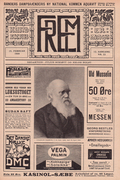The breakthrough of the Evolutionary Theory
When Darwin died in 1882, he was almost a celebrity. Satirical sketches of Darwin and his theory was becoming a recurring theme in Danish magazines. Descriptions of his life and work, introductions, portraits, obituaries, special editions, short stories and novels all inspired by Darwinism, now began to appear everywhere.
The evolutionary theory gained more and more attention from Danish naturalists, who saw the theory as an interesting suggestion. Although Darwin in his last years regretted not being able to convince Japetus Steenstrup of the evolutionary theory, many of Steenstrup’s younger colleagues were now convinced. By the end of the 1800s, Darwin’s theory was no longer controversial and gradually became part of the general teachings in the natural history subjects. By the early 1900s, evolution was being taught in secondary school, high school and at the folk high schools.
In the beginning of the 1900s certain scientific circles in Denmark started to see the evolutionary theory as inadequate and somewhat old-fashioned. The botanist Eugen Warming criticised Darwin’s theory of natural selection and the genetics pioneer Wilhelm Johannsen found parts of Darwin’s theory on heredity to be false. Genetics and the eveolutionary theory did not reunite until the so-called Neo-Darwinist synthesis in the 1930s.
On February 12th 1909 - the centenary of Darwin’s birth – he was celebrated in most Danish newspapers. Darwin was considered a scientific hero, who had changed natural science forever. While many Christian newspapers were cautious to make evolution a shared world view, Liberal and Socialist newspapers eagerly adopted a sort of anti-Christian Darwinism. The fight about Darwin continued.
The editors










